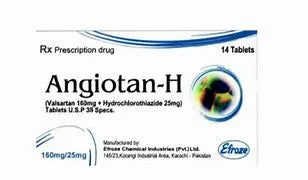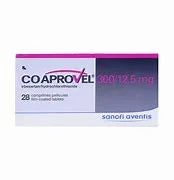Angiotan H 160mg/25mg tablets combine Valsartan, an angiotensin II receptor blocker (ARB), and Hydrochlorothiazide, a thiazide diuretic. Valsartan relaxes blood vessels by blocking angiotensin II, reducing vascular resistance and blood pressure. Hydrochlorothiazide promotes urine production to eliminate excess salt and water, further lowering blood volume and pressure. This dual action provides effective control for essential hypertension, often superior to monotherapy.
Key Benefits:
- Dual mechanism for enhanced blood pressure reduction
- Reduces cardiovascular risks in hypertension
- Manages fluid retention associated with heart failure
- Once-daily dosing for adherence
- Suitable for patients unresponsive to single-agent therapy
How to Use
- Administration: Take orally with or without food; swallow whole with water.
- Dosage: One tablet daily, or as prescribed by your healthcare provider.
- Timing: At the same time each day for consistent effects.
- Consistency: Follow prescribed regimen; do not alter without consultation.
- Monitoring: Regular blood pressure and electrolyte checks advised.
Expert Tips from CureCart Direct:
- Change positions slowly to avoid dizziness from low blood pressure.
- Avoid potassium supplements or salt substitutes unless directed.
- Contact your doctor for symptoms like chest pain, swelling, unrelieved headache, weakness, breathing difficulty, or cough.
- Maintain a low-sodium diet and stay hydrated.
- Do not stop abruptly; taper under medical guidance.
Primary Uses
- Treatment of essential hypertension.
- Management of heart failure.
- Post-myocardial infarction support with left ventricular dysfunction.
Indications
Indicated for hypertension, heart failure (including left ventricular systolic or diastolic dysfunction), and post-heart attack care to improve cardiac outcomes and reduce hospitalization risks.
Side Effects
Common:
- Dizziness or lightheadedness
- Hypotension (low blood pressure)
- Headache
- Fatigue or weakness
Less Common/Rare:
- Syncope (fainting)
- Thrombocytopenia (low platelets)
- Renal dysfunction
- Angioedema (swelling under skin or mucous membranes)
- Electrolyte imbalances (e.g., hyperkalemia from Valsartan, hypokalemia from Hydrochlorothiazide)
Hydrochlorothiazide-specific: Increased urination, orthostatic hypotension. Report severe symptoms immediately.
Warnings and Precautions
- Pregnancy: Contraindicated; potential fetal harm—consult alternatives immediately.
- Lactation: Not recommended; discuss with doctor for safe options.
- Driving: Avoid if dizziness occurs; may impair alertness.
- Alcohol: Avoid; exacerbates hypotension and dehydration.
- Renal Impairment: Caution in severe cases or renal artery stenosis; monitor function.
- Hepatic Impairment: Use cautiously; contraindicated in severe cases.
- Cardiac Conditions: Careful in aortic/mitral stenosis or severe insufficiency.
- Elderly: Monitor potassium levels closely.
- Other: Rise slowly to prevent falls; regular electrolyte and renal checks.
Contraindications
Do not use in:
- Severe hepatic impairment, cirrhosis, biliary obstruction, or cholestasis.
- Primary hyperaldosteronism.
- Known hypersensitivity to Valsartan, Hydrochlorothiazide, or excipients.
- Anuria (no urine output) or severe renal failure.
- Pregnancy or lactation (without consultation).
FAQs
How does this medication work? It relaxes blood vessels (Valsartan) and removes excess fluid/salt via urine (Hydrochlorothiazide) for easier blood flow and lower pressure.
Should I take it at the same time daily? Yes, consistency helps maintain steady blood pressure control.
Is it hard on the kidneys? Long-term use may affect renal blood vessels; regular monitoring is essential.
Can I eat bananas? Avoid potassium-rich foods like bananas, oranges, or greens, as Valsartan can raise potassium levels.
Will it make me sleepy? It may cause drowsiness or dizziness; alcohol worsens this—avoid driving if affected.
Safe for children? Not for children under 6 years; pediatric use requires specialist oversight.
Common Hydrochlorothiazide side effects? Low blood pressure (especially standing), dizziness, headache, weakness.
Best time for Hydrochlorothiazide? Morning after breakfast for single dose; last dose by 6 p.m. to avoid nighttime urination.
Does it increase urination? Yes, as a diuretic, it promotes urine output to reduce fluid and edema from heart, liver, or kidney issues.
Alcohol with Hydrochlorothiazide? Avoid; can intensify side effects like dizziness.
Storage? Room temperature, away from light, moisture, and children.
Onset of action? Effects start in 2 hours, peak at 4 hours, last 6-12 hours.
Related Tests: Blood pressure, renal function (creatinine, BUN), electrolytes (potassium, sodium), liver function.
Dr. Fatima Rehman, MBBS, FCPS – Consultant Cardiologist “Angiotan H 160mg/25mg combines Valsartan and Hydrochlorothiazide for synergistic antihypertensive effects, where the ARB component mitigates vasoconstriction and the diuretic addresses volume overload. This formulation is particularly useful in moderate hypertension with fluid retention, showing additive benefits in clinical trials for blood pressure normalization. Key considerations include the risk of hyperkalemia from Valsartan counterbalanced by Hydrochlorothiazide’s kaliuretic action, though renal function must be monitored to prevent acute kidney injury in susceptible patients. Angioedema remains a rare but serious concern, warranting immediate discontinuation upon onset.”
Disclaimer: This information is for educational purposes only and not a substitute for professional medical advice. Always consult a qualified physician before use. CureCart Direct ensures accurate details but cannot cover all interactions or precautions. Prices and availability subject to change.











Reviews
There are no reviews yet.